Primary navigation
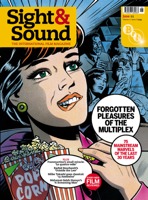
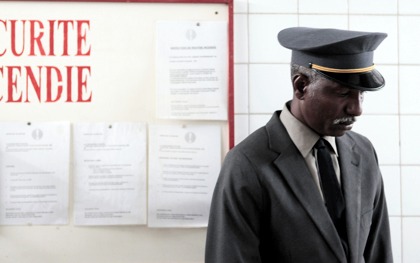
Himself a victim of the long-running civil war in Chad, director Mahamat-Saleh Haroun examines the turmoil in his native land via A Screaming Man, an austere and compelling story of fatherhood. He talks to Suzy Gillett
If there’s a common theme at the core of Chadian director Mahamat-Saleh Haroun’s last three features, it’s ‘the father’ – fathers who hold on to their place in society; fathers who use the excuse of tradition to retain power; fathers who have sent a generation of sons to war. In his latest feature A Screaming Man (Un Homme qui crie) the father in question, Adam (Youssouf Djaoro), is a man who finds himself paralysed in an Africa in transition. When the hotel where he works as a swimming-pool attendant is taken over by new Chinese owners, he finds himself stripped not just of his job, but of his future, his voice, his whole place in society. As assured as it is pared down, Haroun’s film looks into the heart of a man and his family living in a country gripped by never-ending civil war.
Youssouf Djaoro has acted in all three of these films, and A Screaming Man can be seen as the final part of a triptych that began with Abouna (Our Father, 2002) – in which the father is absent and his two abandoned sons set off in search of him – and continued in Daratt (2006), in which a son seeks to avenge his father’s murder, only to find himself taken into the home of the killer, a mute baker, who becomes an unlikely surrogate for the dead father, teaching the young man bread-making and forgiveness.
Mahamat-Saleh Haroun was born and grew up in Chad, but was forced into exile when he was 18, after being shot during the country’s civil war. He spent several years wandering the world, working at odd jobs all the way to China, before settling as a journalist in Bordeaux and making his first short films in the mid-1990s. Since then he has returned again and again to Chad to film a country and a people trapped in the same ongoing civil war, examining the heart-wrenching question: what is it that makes fathers send their sons to die?
As both an outsider and an insider in his native land, Haroun presents audiences with enough distance to observe and understand his characters, while at the same time his films burn with a sense of frustration – with a yearning for peace and beauty to return to his home country. It is this dual perspective that makes his films universal rather than parochial, full of emotions and images that haunt the memory well beyond the end credits.
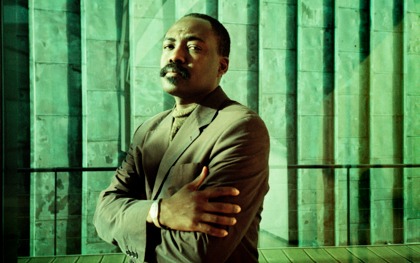
Mahamat-Saleh Haroun. Portrait by Kris de Witte for Sight & Sound
Suzy Gillett: A Screaming Man won the Jury Prize at Cannes in 2010. That the film was in the main competition – as opposed to in a sidebar like Un Certain Regard – seemed like recognition, finally, that African cinema is an integral part of the culture of cinema.
Mahamat-Saleh Haroun: When I sent the film to Cannes to be selected, the selectors called to say they liked it, but didn’t know which section it would be put into. While I was waiting for the reply, I called two very good friends of mine – Wasis Diop, who did the music for the film, and Claire Denis – and told them, “If the film is selected for Un Certain Regard or Out of Competition, I’m not going to accept. If people say, ‘Oh, the film wasn’t selected,’ I just want you both to know what happened.” Then Cannes called me and said, “This is a beautiful film and it is obvious it should be in the main competition.” It was great news.
For me my obsession is how to enter African cinema into the history of the world. We have been absent for so long, we can’t start playing in the tenth division. The fact that we have been invisible for so long means we have to catch up. It is important for the next generation, and film audiences, to sense that there is progress – that something is going on!
‘A Screaming Man is not a Dancing Bear’ is the title of a poem by Aimé Césaire, the French-Martiniquan poet, politician and champion of Négritude. Was it his poem that inspired the film, or did your idea arise another way?
It was more the situation I twice found myself in, filming in Chad with my crew of foreign technicians, who were French, Burkinabé, Belgian. In 2006, while filming Daratt, we were caught in an attack by the rebel forces and couldn’t move, and in 2008 the same thing happened when we were filming Expectations, the short film I was making for a commission by the Jeonju Film Festival in Korea. I felt completely responsible for all these people who were around me – who had come all the way from Paris and from Ouagadougou. I wanted to scream my rage, but against who? And what would that have changed other than making myself feel better?
It was then that I found I had a scream inside me that I couldn’t get out, and afterwards I thought about Césaire. I reread the book [Notebook of a Return to My Native Land] and found this extraordinary passage, and I said to myself, “Voila! Perhaps it’s that – a screaming man is not a dancing bear.” There is a form of civility in Africa that consists of showing the positive side even while people are living incredibly difficult lives, and it is that idea that brought me to the verses of Aimé Césaire.
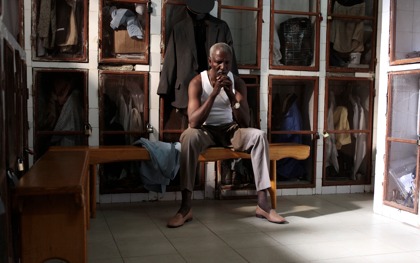
When I was watching this film it felt like the end of a trilogy that you had started with Abouna and Daratt, which both trace the stories of fathers and sons. The first two are about the absent father, and this one is centred on the father who sends his son away, so it is inverted.
Absolutely. It’s like a triptych around the same themes. I centred A Screaming Man around the father, but was really inspired by being taken hostage by this civil war. Then I looked at how I could treat the theme with something very intimate and familiar, and I took the situation of a Chadian family – and in particular the relationship of father and son. Because in this situation [the civil war in Chad], which has gone on for over 45 years, there seems to me to be a transmission which is going on from father to son: the war is essentially fought by men and young men, and it continues – we push them forward into it.
Sacrifice them?
That’s it.
So the civil war in Chad is still ongoing?
It’s not finished. The war is still going on.
In A Screaming Man there is also the fascinating character of the Chinese hotel owner, representing the way China is buying up Africa.
Well yes, things are happening quite discreetly, as the Asiatic idea of propagation has it: we don’t make a lot of noise, we move in, install ourselves discreetly. It’s happening in Chad – there are lots of Chinese moving in, though maybe not as many as in Senegal or in Mali. I was inspired by a Chinese woman who lives in N’Djamena [the capital of Chad] and bought a hotel, and it was in thinking of her that I created Madame Wong.
It is these different fronts of combat that little people like Adam are confronted with. Not only is there the civil war, but there is also globalisation and how to deal with the political, economic and social situation. People like Adam become immobilised – simply because they live in societies that have no organised unions, or any kind of organisation that gathers people in collectives.
The more Africa – or at least Chad – embraces modernity, the more it loses what solidarity in itself it had. Globalisation and capitalism isolate people, so there is no common force [against it], and that’s how it wins. And in Africa this goes against the fundamental culture of the society there, because people show a lot of solidarity in their daily lives, and it is their solidarity – used against the problems they are confronted with on a daily basis in many countries in Africa – that enables them to survive situations that would be catastrophic in other countries and other cultures. If globalisation is putting that solidarity in danger, the situation is serious enough for it to be filmed.
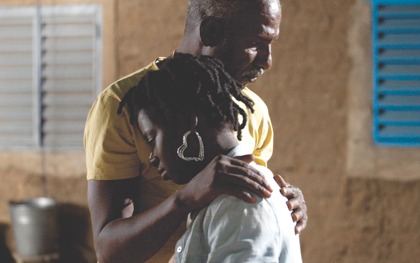
What’s also very powerful in your films is the space you create with colour and light, even in urban scenes, where you locate your characters in the enclosed space of the domestic compounds – and here also the hotel’s enclosure.
This enclosure is also reality – it shows how my characters are caught in a trap. And they are not sure how to escape from it. They are like lions in a cage, and at some point lions who are kept locked up for a long time in a circus lose their minds. We crack, and this is what happens to Adam. His horizon is limited, and when our horizon is limited we are forced to invent something to escape from this daily grind and imprisonment.
In the scenes around the [hotel] swimming pool with Adam, it’s like a theatre stage with different actors, and it gives him the illusion that he is not enclosed and not threatened. It creates a window for him that opens on to other things, and he clings to it like a means of breathing. It’s his oxygen, and when it’s taken away from him he feels he will suffocate.
Let’s go back to the question of fathers and sons. Can I ask you what your relationship was like with your father?
I don’t have any particular problems with my father. We have an excellent relationship. He is a father we would all dream of having in Chad, but I know that my father is an exception. And perhaps because of the education he gave me, I am free to observe the other fathers and make portraits of them to show what they are doing. My father gave me everything I needed to succeed. But my peers in Chad were held back in their stride by their own families, because fathers in Chad have a predatory way about them: they will practically trace the path upon which you will travel, who you will marry, what particular studies you will do.
My father left me to do whatever I wanted to. So it is not astonishing that in Chad I am the only director who is free to speak in the press about religion and society and so on – because my father allows me to. I think most fathers in Chad are like the father I portray in A Screaming Man. And that is due to the education of my father. Which in turn is no doubt due to my grandmother.
She was an only child. She divorced my grandfather when my father, who is almost 70 today, was six. She fled to the desert, taking her son with her on a horse. Her husband, who was an officer in the king’s court, sent soldiers on horses to chase her, and they took my father back and left her to go on her way. Some 64 years ago she did this act, which even today most women in Chad would not be capable of doing. She never remarried and never had any more children.
And it was this woman with such a strong character who brought me up. She told me stories and taught me how to tell stories, and so I owe my temperament to this woman and also to her son, my father, who was also an only child – who was also brought up by her and so inherited her temperament. We are just the product of our own stories – so you need to hear other people’s stories to understand why they are at such and such a place.
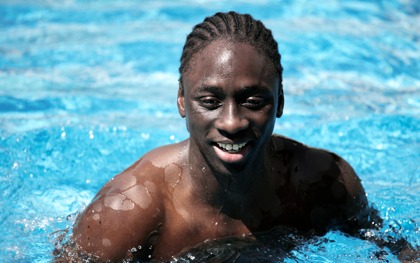
Who are the cinematic influences on your films?
In this film there are influences in the editing, in the sense of ellipsis, in the stripped-down style of the directing, in the absence of artifice – there’s something very bare which I really owe to Bresson. I’m really happy, as I was given the Robert Bresson Prize during the Venice festival. I’m really proud of that. But I also owe an aesthetic to certain kinds of Asian cinema. With the meal scene with the father, son and mother, I render homage to Ozu.
The western is also an important genre for me, because it was all I could see in the cinemas when I was growing up in Abéché. In westerns there is the sense of space, and there is this same space in this part of Chad, which is so desertified. In the last few years I’ve been rediscovering John Ford. His simple stories are still quite layered. Even in films when he was given the story and told to go and make it, he goes off like a good soldier to complete his mission. I am like that: I’ve got a story to tell, and I go off with the same ethic.
What about painters? I remember when you came to London in 2001, you were looking at Caravaggios, in search of a certain light.
That was for Abouna, but painters are not influences, they are references. This time I wanted to use the light in its pure form – not ask the cinematographer to refer to any particular painter, but to show the light in its reality, which in Chad is quite violent.
A Screaming Man has a different DP from Abouna and Daratt, the French cinematographer Laurent Brunet. This time you also produced the film yourself, via your own company [Goï-Goï Productions]. Is this a move towards a new path?
I don’t know if it is a new path or not. It is just that circumstances mean I now have people who can take care of the production, so I have been able to have my own production company, which up until now I didn’t feel able to. The first two films were produced by [Mauritanian director] Abderrahmane Sissako’s production company, but now I’m flying with my own wings – and with the idea that maybe if I met someone, in the way that Abderrahmane met me, I could produce them.
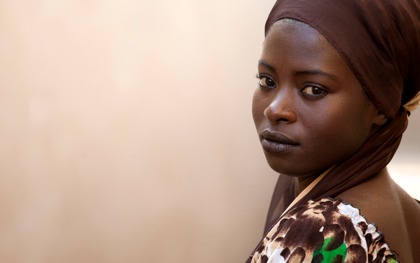
Your short film Expectations hasn’t had as much exposure as your features. There’s a shocking moment in it when the lead character cries – something you hardly ever see an African man do, in films or in life.
Absolutely. That’s exactly what I am trying to do in my films – to show transgressions, things that aren’t usually found in life. Whereas there are a lot of filmmakers in Africa who seem to think cinema is purely to record the life and customs of people. What I’m trying to do is question the injustice that is part of society. I’m trying to push the limits of traditions that only have meaning because they are held in place by the elders who retain power, and who maintain that traditions have to be a certain way. These traditions aren’t based on justice.
My entire cinema is based on the premise that it’s not my traditions that make me African – it’s because I have a certain education, a certain philosophy of life and a certain vision of things. I can lose my traditions and I will still be African. Africa has been enslaved, colonised and lost many of its traditions – and it is more alive than ever.
How do you cast your films? Hardly any films are made in Chad, so how does one become an actor there?
The work of an actor is about having a sensitivity and an intelligence. Youssouf Djaoro has an instinctive intelligence; he acts with an understanding of space, and he has a way with gesture – he even has a particular sensual walk. He carries something within him and he knows how to exploit it, which gives him his strength. I just give him some indications. He is really astonishing, because once he has read the script, he disappears for a week – you don’t see him at all. But when he comes back he is someone else. He incarnates the role to such an extent that after Daratt he shaved his beard and people didn’t recognise him. Even at [the FESPACO film festival in] Ouagadougou, where we are amongst Africans, people didn’t recognise him. It is this capacity for metamorphosis – this capacity to transform himself – that is amazing with him.
The actress who plays the mother [Hadjé Fatimé N’Goua], who is a doctor in a pharmacy, has nothing to do with cinema. We started working together in [Haroun’s 1999 docudrama] Bye Bye Africa. She knows how to be inspired by the women around her to give me what I am looking for. So those two are the main pillars on which the film hangs. Most of the other actors – including [the actress who plays] Madame Wong, Heling Li – I found in Paris.
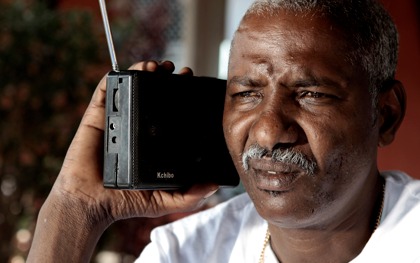
You’re now working on a film about the case of the ship the ‘Probo Koala’ that offloaded toxic waste in Ivory Coast.
We are planning to film in Dakar at the end of the rainy season in August / September 2011. It’s a political thriller called African Fiasco. That’s another new challenge, working with well-known French actors, with another level of budget.
I like the idea of putting ourselves in danger from time to time. After having escaped the civil war after being shot at the age of 18, my whole life has been like a tightrope walker going forward without a tightrope. I always say nothing more can happen to me!
‘A Screaming Man’ is released on 13 May 2011, and is reviewed in the June 2011 issue of Sight & Sound. A retrospective of Haroun’s films runs 13–30 May at BFI Southbank, London
White Material reviewed by Adrian Martin (July 2010)
Daratt reviewed by Roy Armes (August 2007)
Beyond the horizon: Mark Cousins on the New Crowned Hope film commissions, including Haroun’s Dry Season (July 2007)
Invisible classics: Mark Cousins African cinema’s masterworks (February 2007)
Moolaadé reviewed by Philip Kemp (June 2005)
Abouna reviewed by Philip Kemp (December 2002)